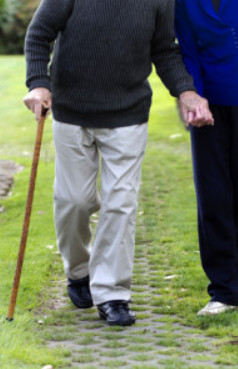
Tips For Elders and Fall Prevention
Tips for Elders and Fall Prevention.
Be sure to checked assisted living home for safety features and fall prevention ideas. Fortunately our home is a single story, so falling down the stairs is not a possibility. But we feel that its a good idea to cover all the types of reasons that could cause a elderly person to fall. We have consulted with the NCOA National Council on Aging and they bring attention to the following reasons and how to avoid falling for elders.
Did you know that one in three older American falls every year? Falls can result in hip fractures, broken bones, and head injuries. There are great tips on how to reduce the risk of falling for the elders. Here are some common factors that can lead to a fall:
Balance and gate: As we age, we lose some coordination, balance and flexibility, mostly due to lack of inactivity. This may make it easier to fall.
Vision: For the aging person, less light reaches the retina and making contrasting edges, tripping hazards, and objects harder to see.
Medication: Some prescriptions and over the counter medication can cause dizziness, dehydration or interactions with each other that can lead to a fall.
Environment: Most seniors have lived in their homes for a long time and just don’t keep it as safe as it should be as they aged.
Chronic conditions: Some of the illnesses like, diabetes, stroke, or arthritis is often the reason they have fallen. Many times their illness has given them a loss of function, inactivity, depression, pain and the use of multiple medications may cause them to fall.
Steps to Help Reduce Falls
- Enlist your senior to let you know if they are concerned about falling. Maybe they can alert you if they feel concerned about falling, dizziness, or balance, suggest they discuss it with their doctor and then find programs that can help them.
- Discuss their current health condition. Find out if they are having trouble remembering to take their medications or if they are experiencing side effects. Encourage them to discuss this with their doctor.
- Ask about their last eye exam. If they wear eyeglasses, make sure they have their most current prescription.
- Notice if they hold onto walls, furniture or have someone else help them when they walk, or if they appear to have trouble walking or arising from a chair. This may be a sign that they need to see a physical therapist. Physical therapist can help older ones improve their balance, strength and gait through exercise. They may even need a cane or walker.
- Talk about their medications. If the elder person is experiencing side effects, they need to discuss this with their doctor or pharmacist.
- Do a walk-through for safety assessment of the living quarters. Lighting, Stairs, Bathrooms, can all be areas where hazards should be checked and changed for a safer home.
